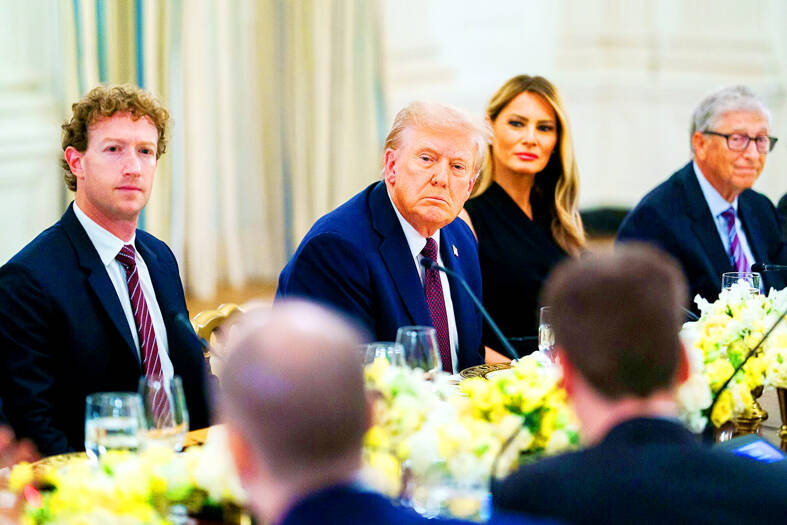US President Donald Trump on Thursday said his administration would impose tariffs on semiconductor imports from companies not shifting production to the US, speaking ahead of a dinner with major technology company CEOs.
Since returning to office in January, Trump’s threat of tariffs has alienated trading partners, stirred volatility in financial markets and fueled global economic uncertainty.
“Yeah, I have discussed it with the people here. Chips and semiconductors — we will be putting tariffs on companies that aren’t coming in. We will be putting a tariff very shortly,” Trump said ahead of a dinner with major tech company CEOs.

Photo: Bloomberg
“We will be putting a very substantial tariff, not that high, but fairly substantial tariff with the understanding that if they come into the country, if they are coming in, building, planning to come in, there will not be a tariff,” Trump told reporters, without giving an exact time or rate.
Trump has made tariffs a pillar of US foreign policy, using them to exert political pressure and renegotiate trade deals, and extract concessions from countries and companies that export goods to the US.
“If they are not coming in, there is a tariff,” Trump said in his comments on semiconductors.
“Like, I would say [Apple CEO] Tim Cook would be in pretty good shape,” he added, as Cook sat across the table.
IPhone maker Apple recently raised its total domestic investment commitment in the US to US$600 billion over the next four years as tech leaders have warmed up to Trump in his second term.
Trump last month said that the US would impose a tariff of about 100 percent on imports of semiconductors, but it would not apply to companies that are manufacturing in the US or have committed to do so.
Taiwanese chip giant Taiwan Semiconductor Manufacturing Co (台積電) and South Korea’s Samsung Electronics and SK Hynix have announced investments in chip manufacturing in the US.
Trump has faced legal pushback in his use of tariffs. His administration has asked the US Supreme Court to swiftly hear a bid to preserve his sweeping tariffs pursued under a 1977 law meant for emergencies after a lower court invalidated most of the levies that have been central to his economic and trade agenda.

Taiwan Semiconductor Manufacturing Co (TSMC, 台積電) secured a record 70.2 percent share of the global foundry business in the second quarter, up from 67.6 percent the previous quarter, and continued widening its lead over second-placed Samsung Electronics Co, TrendForce Corp (集邦科技) said on Monday. TSMC posted US$30.24 billion in sales in the April-to-June period, up 18.5 percent from the previous quarter, driven by major smartphone customers entering their ramp-up cycle and robust demand for artificial intelligence chips, laptops and PCs, which boosted wafer shipments and average selling prices, TrendForce said in a report. Samsung’s sales also grew in the second quarter, up

On Tuesday, US President Donald Trump weighed in on a pressing national issue: The rebranding of a restaurant chain. Last week, Cracker Barrel, a Tennessee company whose nationwide locations lean heavily on a cozy, old-timey aesthetic — “rocking chairs on the porch, a warm fire in the hearth, peg games on the table” — announced it was updating its logo. Uncle Herschel, the man who once appeared next to the letters with a barrel, was gone. It sparked ire on the right, with Donald Trump Jr leading a charge against the rebranding: “WTF is wrong with Cracker Barrel?!” Later, Trump Sr weighed

LIMITED IMPACT: Investor confidence was likely sustained by its relatively small exposure to the Chinese market, as only less advanced chips are made in Nanjing Taiwan Semiconductor Manufacturing Co (TSMC, 台積電) saw its stock price close steady yesterday in a sign that the loss of the validated end user (VEU) status for its Nanjing, China, fab should have a mild impact on the world’s biggest contract chipmaker financially and technologically. Media reports about the waiver loss sent TSMC down 1.29 percent during the early trading session yesterday, but the stock soon regained strength and ended at NT$1,160, unchanged from Tuesday. Investors’ confidence in TSMC was likely built on its relatively small exposure to the Chinese market, as Chinese customers contributed about 9 percent to TSMC’s revenue last

LOOPHOLES: The move is to end a break that was aiding foreign producers without any similar benefit for US manufacturers, the US Department of Commerce said US President Donald Trump’s administration would make it harder for Samsung Electronics Co and SK Hynix Inc to ship critical equipment to their chipmaking operations in China, dealing a potential blow to the companies’ production in the world’s largest semiconductor market. The US Department of Commerce in a notice published on Friday said that it was revoking waivers for Samsung and SK Hynix to use US technologies in their Chinese operations. The companies had been operating in China under regulations that allow them to import chipmaking equipment without applying for a new license each time. The move would revise what is known